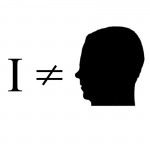 We are not Cartesian egos. We are not biological organisms either.
We are not Cartesian egos. We are not biological organisms either.
Not Cartesian egos
A Cartesian ego is a kind of mental or spiritual thing that is thought to inhabit a human body and give it life. Many people believe we can exist independently of a human body – that we survive the death of our bodies, continuing to have experiences either without a body, or by being reborn in another body.
I hardly need to argue against Cartesian egos. The idea is in widespread disrepute without any assistance from me. It is hard to reconcile with a scientific view of the world. We have no convincing evidence that such things exist. Until we have, we should use Occam’s Razor for its intended purpose to prune them from our conceptual scheme. Leaving them in creates clutter and awkward problems.
One problem comes from split brain research. When the corpus callosum connecting a patient’s two cerebral hemispheres is cut, two centres of consciousness appear where there was one before. Should we conclude that the surgeon’s knife divided a spiritual substance? Instead of deepening our understanding, this multiplies mysteries.
Despite its academic unrespectability, the idea that we are Cartesian egos is embraced by billions of people. It is deeply involved with emotion, as this passage from Umberto Eco’s novel The Mysterious Flame of Queen Loana illustrates:
One evening the spiritual director stood in front of the altar balustrade, illuminated – like all of us, like the entire chapel – by that single candle that haloed him in light, leaving his face in darkness. Before dismissing us, he told us a story. One night, in a convent school, a girl died, a young, pious, beautiful girl. The next morning, she was stretched out on a catafalque in the nave of the church, and the mourners were reciting their prayers for the deceased, when all of a sudden the corpse sat up, eyes wide and finger pointing at the celebrant, and said in a cavernous voice, “Father, do not pray for me! Last night I had an impure thought, a single thought – and now I am damned!” Continue reading “What We Are Not”
 (video on – metallic cylindrical interior)
(video on – metallic cylindrical interior)



 We are not Cartesian egos. We are not biological organisms either.
We are not Cartesian egos. We are not biological organisms either.
 Imagine, in the early days of books, a small library consisting entirely of original manuscripts. Some of them are very old, and have been attacked by mice. Some have deteriorated so much that their pages crumble to dust when the custodian of the library tries to read them. He mourns the loss of these books, and contemplates the inevitable decay of the remaining books with sorrow. To be sure, new manuscripts are occasionally added to the library, but they cannot replace the volumes that are lost forever. This goes on until, one day, the young assistant librarian has an idea. “This book will be unreadable in five years,” he tells his elder. “But I can read it now. If I copy the words of this book onto sheets of new vellum, and bind them in a strong new binding, we will be able to read it for many decades to come.” The old librarian tenderly strokes the cracked spine of the crumbling volume, and shakes his head. “What good is a copy? It wouldn’t be the same book.”
Imagine, in the early days of books, a small library consisting entirely of original manuscripts. Some of them are very old, and have been attacked by mice. Some have deteriorated so much that their pages crumble to dust when the custodian of the library tries to read them. He mourns the loss of these books, and contemplates the inevitable decay of the remaining books with sorrow. To be sure, new manuscripts are occasionally added to the library, but they cannot replace the volumes that are lost forever. This goes on until, one day, the young assistant librarian has an idea. “This book will be unreadable in five years,” he tells his elder. “But I can read it now. If I copy the words of this book onto sheets of new vellum, and bind them in a strong new binding, we will be able to read it for many decades to come.” The old librarian tenderly strokes the cracked spine of the crumbling volume, and shakes his head. “What good is a copy? It wouldn’t be the same book.”  Roger Beethey shows up late, with a blonde. Elliot gives him a pleading look. “Relax,” says Beethey.
Roger Beethey shows up late, with a blonde. Elliot gives him a pleading look. “Relax,” says Beethey. Getting into the Institute turned out to be easy. Arriving in a crowd from the bus, he found the iid-controlled gate held open for him by a smiling girl. Security at that boundary is given low priority. The ‘free-campus’ tradition. Half-hidden in a big armchair in a departmental Reading Room – not his own department’s – he checks the messages on his phone. Nothing new that matters. He re-reads Elliot’s reply to EB, agreeing to meet before class. Elliot must be in his car by now, probably in slow traffic on the Expressway.
Getting into the Institute turned out to be easy. Arriving in a crowd from the bus, he found the iid-controlled gate held open for him by a smiling girl. Security at that boundary is given low priority. The ‘free-campus’ tradition. Half-hidden in a big armchair in a departmental Reading Room – not his own department’s – he checks the messages on his phone. Nothing new that matters. He re-reads Elliot’s reply to EB, agreeing to meet before class. Elliot must be in his car by now, probably in slow traffic on the Expressway. Instead of the motel on Bridgeport, as the other Elliot wanted, he checks into the Verdmont for what remains of the night. He owes himself that much. He is a bit surprised that his iid still opens doors. The other Elliot could have changed his code, which would have made his own implant useless. But the surprise vanishes when he thinks of what he would have done in the other’s place. Without a valid iid, he could hardly last a day in Waterloo without coming to the attention of the police. He has to eat, to sleep somewhere, and although he knows that resourceful denizens of the city’s underbelly do so without an iid, he cannot. He might, of course, approach the authorities for assistance, were it not that he fears publicity just as much as the other does. As the other Elliot said last night, the stikists could ‘get mileage’ out of this. That could set the itravel industry back ten years.
Instead of the motel on Bridgeport, as the other Elliot wanted, he checks into the Verdmont for what remains of the night. He owes himself that much. He is a bit surprised that his iid still opens doors. The other Elliot could have changed his code, which would have made his own implant useless. But the surprise vanishes when he thinks of what he would have done in the other’s place. Without a valid iid, he could hardly last a day in Waterloo without coming to the attention of the police. He has to eat, to sleep somewhere, and although he knows that resourceful denizens of the city’s underbelly do so without an iid, he cannot. He might, of course, approach the authorities for assistance, were it not that he fears publicity just as much as the other does. As the other Elliot said last night, the stikists could ‘get mileage’ out of this. That could set the itravel industry back ten years.